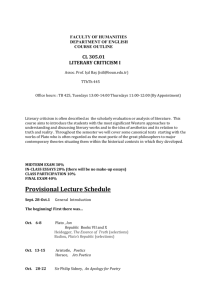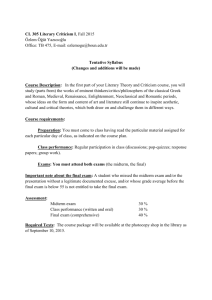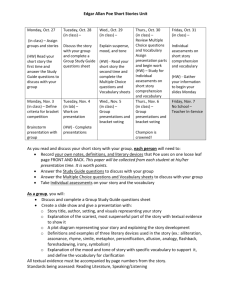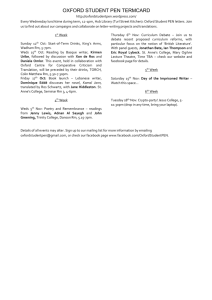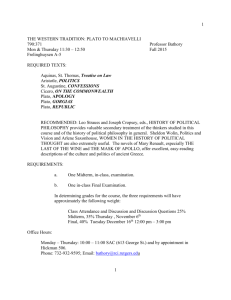POLS 3201-01 Lattanzi
advertisement
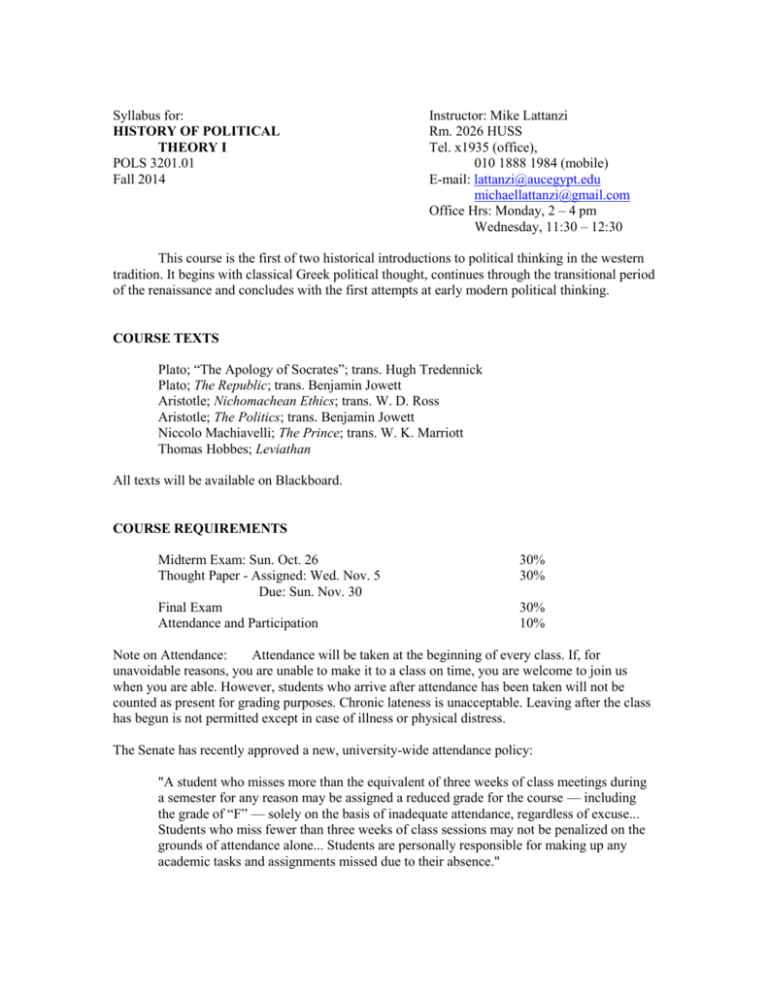
Syllabus for: HISTORY OF POLITICAL THEORY I POLS 3201.01 Fall 2014 Instructor: Mike Lattanzi Rm. 2026 HUSS Tel. x1935 (office), 010 1888 1984 (mobile) E-mail: lattanzi@aucegypt.edu michaellattanzi@gmail.com Office Hrs: Monday, 2 – 4 pm Wednesday, 11:30 – 12:30 This course is the first of two historical introductions to political thinking in the western tradition. It begins with classical Greek political thought, continues through the transitional period of the renaissance and concludes with the first attempts at early modern political thinking. COURSE TEXTS Plato; “The Apology of Socrates”; trans. Hugh Tredennick Plato; The Republic; trans. Benjamin Jowett Aristotle; Nichomachean Ethics; trans. W. D. Ross Aristotle; The Politics; trans. Benjamin Jowett Niccolo Machiavelli; The Prince; trans. W. K. Marriott Thomas Hobbes; Leviathan All texts will be available on Blackboard. COURSE REQUIREMENTS Midterm Exam: Sun. Oct. 26 Thought Paper - Assigned: Wed. Nov. 5 Due: Sun. Nov. 30 Final Exam Attendance and Participation 30% 30% 30% 10% Note on Attendance: Attendance will be taken at the beginning of every class. If, for unavoidable reasons, you are unable to make it to a class on time, you are welcome to join us when you are able. However, students who arrive after attendance has been taken will not be counted as present for grading purposes. Chronic lateness is unacceptable. Leaving after the class has begun is not permitted except in case of illness or physical distress. The Senate has recently approved a new, university-wide attendance policy: "A student who misses more than the equivalent of three weeks of class meetings during a semester for any reason may be assigned a reduced grade for the course — including the grade of “F” — solely on the basis of inadequate attendance, regardless of excuse... Students who miss fewer than three weeks of class sessions may not be penalized on the grounds of attendance alone... Students are personally responsible for making up any academic tasks and assignments missed due to their absence." ACDEMIC INTEGRITY Students are responsible for familiarizing themselves with the AUC policy on academic integrity, which can be found at the following site: http://www.aucegypt.edu/academics/integrity/Pages/default.aspx I take questions of academic integrity very seriously and violations of the AUC policy on integrity will be reported to the Academic Integrity Committee. If a student has any questions about this policy – esp. what would qualify as an instance of plagiarism – please consult me before submitting work. Once a paper is submitted, I will presume that the student understands the academic integrity policy and what counts as a violation of it. Let me stress this again: please consult me before work is submitted. It is best for all of us if possible violations of the academic integrity policy are caught before they occur. OUTLINE Note: According to the AUC academic calendar for 2014-15, all classes held on SundayWednesday schedules must make up two extra class sessions outside of regularly scheduled class hours. We will decide as a class exactly how these two classes will be made up. i) Introduction Sept. 7, 10, 14, 17 Reading: What is political theory? What is political philosophy? Tradition and Critique Plato; “The Apology of Socrates” ii) Classical Greek Political Philosophy Sept. 21, 24, 28; Oct. 1, 8 Reading: Plato Plato; The Republic; Books I, II, IV, V, VI, VII Please Note: Due to the Eid El Adha holiday, there will be no class on Oct. 5 Oct. 12, 15, 19, 22 Reading: Oct. 26 Aristotle I Aristotle; Nichomachean Ethics; Books I, II, V, VI *** Midterm Exam *** Oct. 29; Nov. 2, 5. 9 Aristotle II Reading: Aristotle; The Politics; Books I, II (chapters 1-5), III, IV (chapters 1, 2, 11, 12) Nov. 5 *** Thought Paper Assigned *** iii) Transition to Renaissance Nov. 12 Late Classical Political Philosophy No Reading Nov. 16 Medieval and Scholastic Political Philosophy No Reading iv) Renaissance Political Thinking Nov. 19, 23, 26 Reading: Machiavelli Machiavelli; The Prince v) Early Modern Political Theory Nov. 30; Dec. 3, 7, 10 Reading: Nov. 30 Hobbes Hobbes; Leviathan; Introduction, Part I (chapters 1-8, 1316), Part II (chapters 17-21, 29) *** Thought Paper Due *** vi) Conclusion Dec. 14 Conclusion and Review
